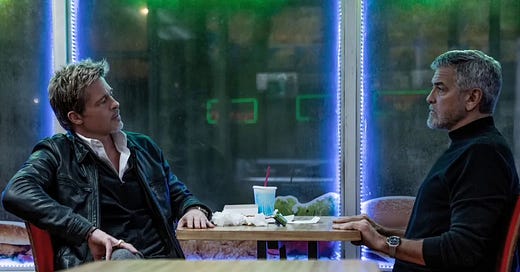Something On Sunday: "Wolfs" and the Absence Of Women.
It's not a film about "cleaners," it's a film about men growing old and needing each other.
There is a moment in the AppleTV+ film “Wolfs” where an Albanian gangster — at some point Hollywood decided the Albanians were the new Russians — realizes a deeply held secret.
George Clooney and Brad Pitt, two “lone wolves” who clean up the messes of other people, aren’t really wolfs at all.
“You are buddies!”
That, in the film’s plot, is a reason to ge…
Keep reading with a 7-day free trial
Subscribe to Tim Goodman / Bastard Machine to keep reading this post and get 7 days of free access to the full post archives.




